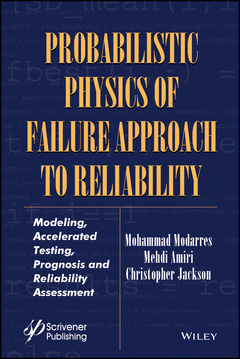Probabilistic Physics of Failure Approach to Reliability Modeling, Accelerated Testing, Prognosis and Reliability Assessment Coll. Performability Engineering
Auteurs : Modarres Mohammad, Amiri Mehdi, Jackson Christopher

The book presents highly technical approaches to the probabilistic physics of failure analysis and applications to accelerated life and degradation testing to reliability prediction and assessment. Beside reviewing a select set of important failure mechanisms, the book covers basic and advanced methods of performing accelerated life test and accelerated degradation tests and analyzing the test data. The book includes a large number of very useful examples to help readers understand complicated methods described. Finally, MATLAB, R and OpenBUGS computer scripts are provided and discussed to support complex computational probabilistic analyses introduced.
Preface xi
1 Overview of Probabilistic Physics-of-Failure Approach to Reliability 1
1.1 Introduction 1
1.2 Overview of Physics-of-Failure Modeling 2
1.3 Important Forms of PoF Models 4
1.4 PPoF Approach to Life Assessment 6
1.5 Accelerated Testing in PPoF Model Development 8
1.6 Organization of the Book 10
References 11
2 Summary of Mechanisms of Failure and Associated PoF Models 13
2.1 Introduction 13
2.2 Fatigue 15
2.3 Wear 60
2.4 Creep 81
2.5 Corrosion 90
References 97
3 Types of Accelerated Testing and Modeling Concepts 101
3.1 Introduction 101
3.2 Types of Accelerated Testing – Qualitative and Quantitative 101
3.3 Qualitative Accelerated Tests 102
3.4 Quantitative Accelerated Tests 107
References 115
4 Analysis of Accelerated Life Testing Data and Physics-Based Reliability Model Development 117
4.1 Introduction 117
4.2 Accelerated Life Data Analysis Methods 117
4.3 Basics of ALT Data Analysis 117
4.4 Types of Collected Accelerated Life Test Data 118
4.5 Life-stress Models 119
4.6 Probability Plotting Method for ALT Model Estimation 124
4.7 Maximum Likelihood Estimation Approach to ALT Data Analysis 131
4.8 Confidence Intervals for MLE 134
4.9 MLE Approach to Estimating Parameters of Common Distributions 136
4.10 MLE-Based Parameter Estimation for Different Life-stress Models 139
4.11 Proportional Hazards (PH) Model 168
4.12 Bayesian Estimation Approach to ALT Model Parameter Estimation 171
4.13 Determining stress dependencies 175
4.14 Summary of the ALT Steps and Common Problems in Practice 178
4.15 Time Varying Stress Tests 179
4.16 Step-Stress Analysis And Model Development 182
References 201
5 Analysis of Accelerated Degradation Data and Reliability Model Development 203
5.1 Introduction 203
5.2 Degradation Models 205
References 231
6 Accelerated Test Planning 233
6.1 Introduction 233
6.2 Issues to Consider Prior to Accelerated Testing 233
6.3 Planning for Accelerated Life Tests 237
6.4 Planning for Accelerated Degradation Tests 246
References 250
7 Accounting for Uncertainties and Model Validation 251
7.1 Introduction 251
7.2 Uncertainties in Evidence 251
7.3 PPoF Model Uncertainties, Errors, and Validation 259
7.4 Applications of Model Validation in ADT 263
References 268
Index 269
Mohammad Modarres is Director, Center for Risk and Reliability and the Nicole Y. Kim Eminent Professor of Engineering, University of Maryland; M.S. (1977) and PhD (1980) in Nuclear Engineering from MIT, and M.S. in Mechanical Engineering also from MIT (1977). He has more than 400 papers in archival journals and proceedings of conferences, including several books and textbooks in various areas of nuclear safety, risk and reliability engineering. He is a University of Maryland Distinguished Scholar-Teacher and a fellow of the American Nuclear Society.
Mehdi Amiri is an adjunct professor in the Department of Mechanical Engineering, George Mason University; M.S. (2006) in Mechanical Engineering from University of Tehran, Iran and PhD (2011) in Mechanical Engineering from Louisiana State University (LSU). His main research interests include materials, failure prediction through simulation-based modeling of the microstructural defects, with current emphases on additively manufactured materials, and nondestructive evaluation and testing.
Christopher Jackson is the Acting Director of the Centre of Reliability and Resilience Engineering at the B. John Garrick Institute for the Risk Sciences, University of California, Los Angeles. He graduated with a PhD (2011) and MS (2007) in Reliability Engineering from the University of Maryland, a Masters of Military Studies (2012) from the Australian National University, and a Bachelor of Engineering (Mechanical 2001) from the University of New South Wales. His current research thrusts revolve around Bayesian analysis, big data analysis and complex system modelling.
Date de parution : 06-2017
Ouvrage de 288 p.
18x25.7 cm
Thème de Probabilistic Physics of Failure Approach to Reliability :
Mots-clés :
probabilistic; approach; physicsoffailure; overview; important; pof; forms; models; ppof approach; ppof model; organization; references; failure; mechanisms; summary; book; references types; concepts; accelerated



